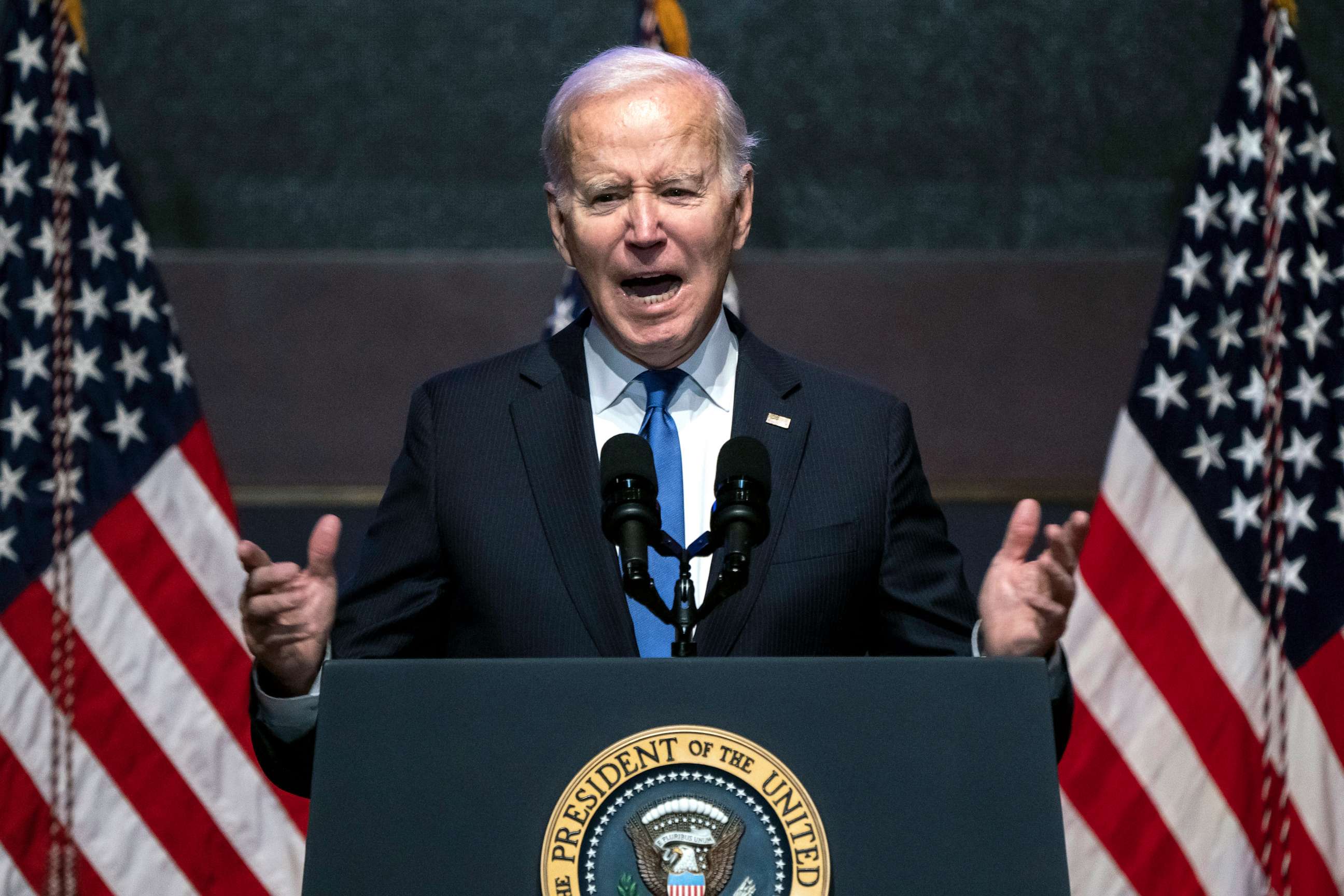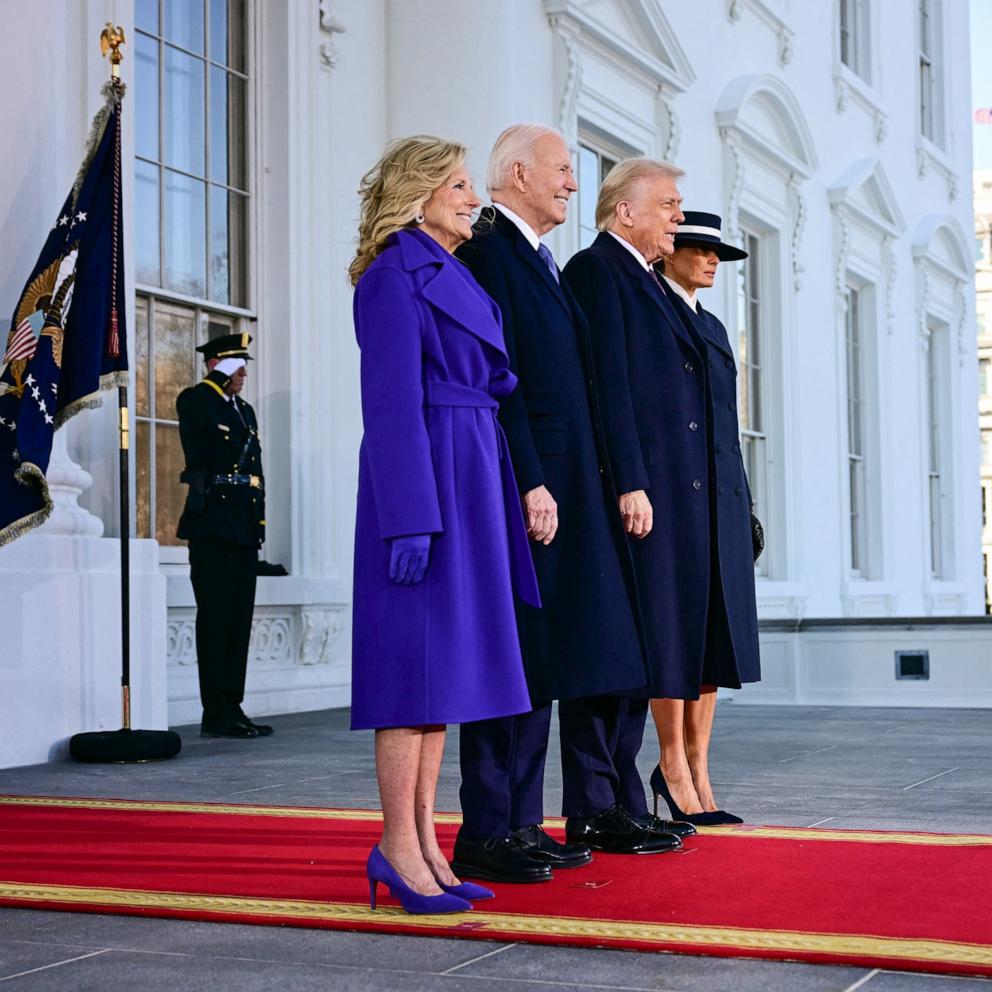Biden to deliver State of the Union address before empowered GOP
President Joe Biden's second State of the Union address comes at a pivotal moment as he lays out not only his accomplishments and agenda, but makes the case for his leadership ahead of an expected announcement about whether he'll run for reelection.
Unlike his first two years in office, though, Republicans now control the House of Representatives, determined to block his priorities -- and already forcing a high-stakes battle over spending cuts that could cause the nation to default on its debt.
If he does run again, the president -- at 80, the oldest in the nation's history -- will have to persuade voters, expressing record economic discontent, that they would be better off with him when even many Democrats have their doubts.

Pushing bipartisanship amid acrimony
In his remarks -- which he worked on with advisers over the weekend at Camp David, according to the White House -- he's expected to call on Republicans to work together with him, underscoring "the progress the American people want us to make by working together in the year ahead," a White House official said.
His prime-time speech, though, comes as he faces constant antagonism from those same Republicans -- including over his possible mishandling of classified documents, for which he is under investigation by a special counsel. The White House has deflected questions about why it has not been more transparent throughout the saga.
Republicans on Capitol Hill have also criticized the president's handling of the suspected Chinese spy balloon the U.S. military shot down off the Atlantic coast Saturday; many GOP politicians have said the administration should have taken it out before it traversed the country.
Whereas Biden devoted nearly a fifth of his State of the Union speech last year to the days-old Russian invasion of Ukraine, his remarks this year will likely focus more on his legislative accomplishments -- how the federal government is "investing in America," as he has said during recent remarks.

Whereas he declared during his speech last year that the U.S. had "reached a new moment in the fight against COVID-19," in recent months Biden has focused less and less of his public remarks on the coronavirus pandemic, with Americans -- and the economy -- largely moving on.
The president, the White House official said, "will highlight the progress we have already made – and will keep fighting to make -- on these and other commitments and priorities, illustrating in real terms how transformational his pieces of legislation are for Americans across the country."
It's a calculated political move that comes just before he may launch his reelection effort.
The next two years of his presidency will not likely see the same degree of legislative accomplishments he enjoyed during the first two, with Republicans in the House determined to put roadblocks in the way.

Persuading Americans they're better off
As the fruits of those laws only now just begin to become tangible for Americans -- shovels breaking ground on infrastructure projects, the price of insulin dropping, taxes falling on clean technologies -- Biden is hoping to take credit and boost his perennially low approval ratings.
"Next week, I'll be reporting on the state of the union," he said Friday, as he celebrated the surprisingly large number of jobs created in January. "But today -- today, I'm happy to report that the state of the union and the state of our economy is strong."
But it'll be an uphill battle persuading Americans he has helped improve their personal finances.
In a recent ABC News/Washington Post poll, four in 10 Americans said they've gotten worse off financially since Biden became president -- the most in nearly three dozen ABC/Post polls to ask the question since 1986. Just 16% said they were better off.
That said, Biden is helped by the way Americans view Republicans. In the same poll, the public took Biden's side in the debt ceiling debate, with 65% backing his approach of handling debt payments and federal spending as separate issues; just 26% support that of the newly minted speaker of the House of Representatives, Republican Kevin McCarthy, who has threatened to let the U.S. default on its debt if the president does not agree to spending cuts.

Touting accomplishments as Americans don't give credit
The economy is central to the president's message – and Americans' concerns about the future.
Biden aides argue the president has numerous monumental achievements to speak of -- and that people are just now beginning to see the impact.
Biden has several positive indicators he can point to on Tuesday evening: High inflation is moderating, gas prices have fallen from their highs last year and the labor market remains strong.
In the past year, the president pushed through two significant pieces of legislation tackling his domestic priorities: a massive health, climate and tax bill known as the Inflation Reduction Act and a significant investment in semiconductor manufacturing, through the CHIPS and Science Act.
"On all three of the major pieces of legislation -- on infrastructure, CHIPS and Science, and on the inflation Reduction Act, 2023 is the year in which the most significant impact will begin to occur," Biden's top economic adviser, Brian Deese, told reporters Monday.

Biden has also celebrated other bills passed by Congress in the past year, including the Respect for Marriage Act, which codified federal protections for same-sex and interracial marriages, and the Safer Communities Act, which included a number of gun reform measures.
But broadly speaking, Americans see it very differently, according to the recent ABC/Post poll.
Just 36% of Americans said they thought Biden had accomplished a great deal or good amount as president; 62% said he had accomplished not very much or nothing.
Nor did Biden get much credit for a disparate list of items he might raise in Tuesday's address. Unemployment has dropped from 6.3% when Biden took office to 3.4% now -- a low since 1969 -- and the economy added a robust 517,000 jobs last month – yet the public, by 60-34%, said he has not made progress "creating more good jobs in your community."
In an effort to combat that perception, Biden hit the road three times last week, highlighting his infrastructure law's investments in major train tunnel projects in Baltimore and New York and in replacing lead pipes in Philadelphia.
He also renewed a push for Congress to enshrine paid family and medical leave into law; Republicans and Democratic Sen. Joe Manchin, of West Virginia, prevented that from happening in 2021.
"I want to talk to the American people and let them know the state of affairs -- what's going on and what I'm looking forward to working on from this point on, what we've done," Biden told reporters Monday. "And just have a conversation with the American people."
While Biden's pitching himself to Republicans, he also needs to make the case to Democrats.
In the ABC/Post poll, just 31% of Democrats and Democratic-leaning independents said the party should nominate Biden for reelection; 58% said it should pick someone else.

Will guns and policing reform take a backseat?
Meanwhile, it remains to be seen how much of his speech Biden will devote to the issues of gun control and policing reform, two areas where Democrats have fallen short of reaching their lofty goals of reform.
Recent mass shootings in California and the brutal beating of Tyre Nichols at the hands of five police officers in Memphis have once again put pressure on Biden to use his bully pulpit to prioritize those issues.
Asked last week how much emphasis Biden would place on policing reform, White House press secretary Karine Jean-Pierre would not say.
On Thursday, she told ABC News Senior White House Correspondent Mary Bruce that Biden had "been working on his speech for some time" and that Americans could expect to hear from Biden about "how he is optimistic about the future of his country" and "the possibilities that we have as a country, especially as we look at our economy."
'Unity agenda'
Biden will double-down on this strategy of looking for areas of compromise with newly-empowered House Republicans.
"In his State of the Union today, the president will announce a new set of policies to continue to make progress advancing his unity agenda and deliver results for families across the country," White House Communications Director Kate Bedingfield said on a call with reporters Tuesday.
The agenda was unveiled last year, targeting areas where the administration felt both sides of the aisle could come together, even in a politicized environment, to get things done. The four areas include ending cancer, taking care of veterans, tackling the mental health crisis, and addressing the opioid and overdose epidemic.

McCarthy-Biden relationship to put bipartisanship push to the test
Like last year, Biden is expected to call for bipartisanship, underscoring "the progress the American people want us to make by working together in the year ahead," the White House official said.
This year, the official said, "the president will once again amplify his belief that Democrats and Republicans can work together, as they did in the last two years and as he is committed to doing with this new Congress to get big things done on behalf of the American people."
Tuesday's address will mark the first time a Republican, McCarthy, will sit in a position of power on the dais behind the president while he speaks.
How Biden's relationship with McCarthy develops in the coming months will put his desire for bipartisanship to the test.

The president and the speaker met in the Oval Office last week as Republicans threaten a catastrophic default if the White House does not agree to broad, unspecified spending cuts. Afterward, both men called their talks "good."
While Ukraine dominated his speech last year, it is unlikely to play such a major role. The White House official did say, though, that Biden will "outline the progress made on maintaining international alliances to defend Ukraine, compete with China, and assert American leadership in the world."
Arkansas Gov. Sarah Huckabee Sanders plans to deliver this year's official Republican response to the State of the Union address. She will likely paint a picture of an economy that has struggled under Biden.
Sanders, formerly President Donald Trump's press secretary, has also made "culture war" issues a focus of her governorship since taking office last month.
"Governor Sarah Huckabee Sanders is the youngest governor in the nation and a powerful advocate for the popular, commonsense conservative principles that will put our country back on a better course," Senate Minority Leader Mitch McConnell said in a statement last week.
ABC News' Sarah Kolinovsky, Christine Filer, Gary Langer and Molly Nagle contributed to this report.




